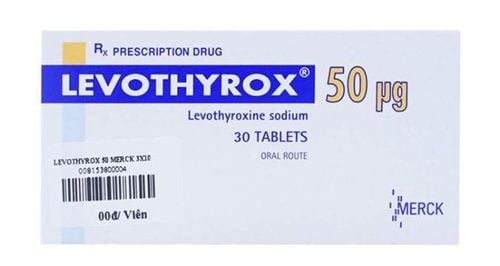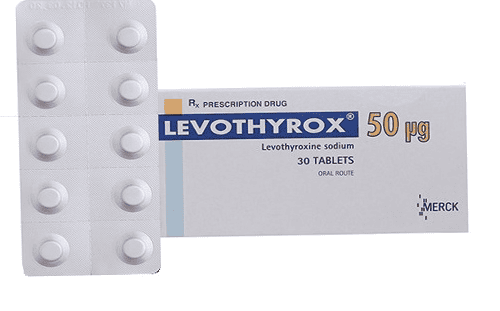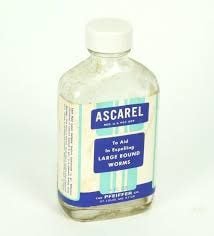This is an automatically translated article.
The article was written by Pharmacist Quang Anh Nguyet - Pharmacist of Faculty of Pharmacy - Vinmec Central Park International General Hospital.
Levothyroxine works to prevent symptoms of hypothyroidism. This is a synthetic version of the hormone thyroxine, a hormone found mainly in the thyroid gland.
1. Composition and use of levothyroxine
Ingredients: Levothyroxine 100 micrograms.
Uses:
Supplementing thyroid hormone for people with hypothyroidism, or after thyroidectomy. Treatment of benign goiter when thyroid function is normal. Combine treatment of hyperthyroidism with antithyroid drugs after normal thyroid status is achieved.
2. What is the dose of levothyroxine for adults and children?
2.1 Adults
People over 50 years old being treated for recent hyperthyroidism or people who have had hypothyroidism in the past few months: Take 1.7 micrograms/kg/day. The usual dose should not exceed 200 micrograms/day. Adjust dose according to TSH (Thyroid Stimulating Hormone) levels every 6-8 weeks. Severe hypothyroidism: Initially 12.5 - 25 micrograms/day, add 25 micrograms/day every 2-4 weeks if needed. Asymptomatic hypothyroidism: 1 microgram/kg/day. People over 50 years old, people with comorbid cardiovascular disease: Initially 25 micrograms/day, add or remove 25 micrograms/day every 4 weeks depending on response.

Người bệnh cần tuân thủ đúng liều lượng chỉ định của bác sĩ khi uống levothyroxine
2.2 Children
100 micrograms/m2/day. Increase or decrease by 25 micrograms/day every 2 to 4 weeks to maintain upper limit of thyroxine and normal range of TSH. Drink 30 - 60 minutes before the first meal of the day.
3. What are the forms and strengths of levothyroxine?
Levothyroxine tablets 100 μcg (Berlthyrox 100 μcg, Levothyrox 100 μcg) Levothyroxine tablets 50 μcg (Berlthyrox 50 μcg, Levothyrox 50 μcg).

Thuốc levothyroxine có 2 hàm lượng là: Viên nén levothyroxine 100 μcg và Viên nén levothyroxine 50 μcg
4. Common side effects when taking levothyroxine drug
Symptoms like hyperthyroidism: Tachycardia, arrhythmia, agitation, insomnia, flushing, sweating, diarrhea, excessive weight loss. Increased ischemic symptoms in patients with myocardial ischemia. Decreased bone density in postmenopausal women. Cranial stenosis and increased bone age in neonates. Benign intracranial hypertension with headache, vomiting, papilledema.
5. Precautions when using levothyroxine in pregnant and lactating women
Levothyroxine is safe for pregnant women (A (FDA) (*), A (TGA) (**)). Pregnant women with hypothyroidism treated with thyroid hormone levothyroxine should have FT4 and TSH tests every 6-8 weeks during pregnancy to monitor their health because thyroid hormone needs will increase during pregnancy. pregnancy, requiring an increased dose of the drug.
Levothyroxine is safe for nursing women because the amount of drug secreted into breast milk is very small. Lactating women with hypothyroidism treated with levothyroxine should not stop taking or reduce the dose of the drug to maintain hormone levels, help maintain breast milk supply. If hypothyroidism increases, the mother may lose milk.

Thuốc levothyroxine an toàn cho cả phụ nữ mang thai và cho con bú
6. Some other notes
No dose adjustment is required in patients with renal impairment. Contraindicated for people with hypersensitivity to the ingredients of the drug, people with untreated hyperthyroidism, pregnant women taking antithyroid drugs. Be careful with people with hypopituitarism, untreated adrenal insufficiency, cardiovascular disease, diabetes, the elderly. If you notice any unusual health problems, you should visit and consult with a specialist.
Please dial HOTLINE for more information or register for an appointment HERE. Download MyVinmec app to make appointments faster and to manage your bookings easily.
SEE MORE
Does taking thyroid medicine affect the fetus? Alverin is an antispasmodic of the gastrointestinal tract Ampicillin drugs: Uses, doses and side effects













